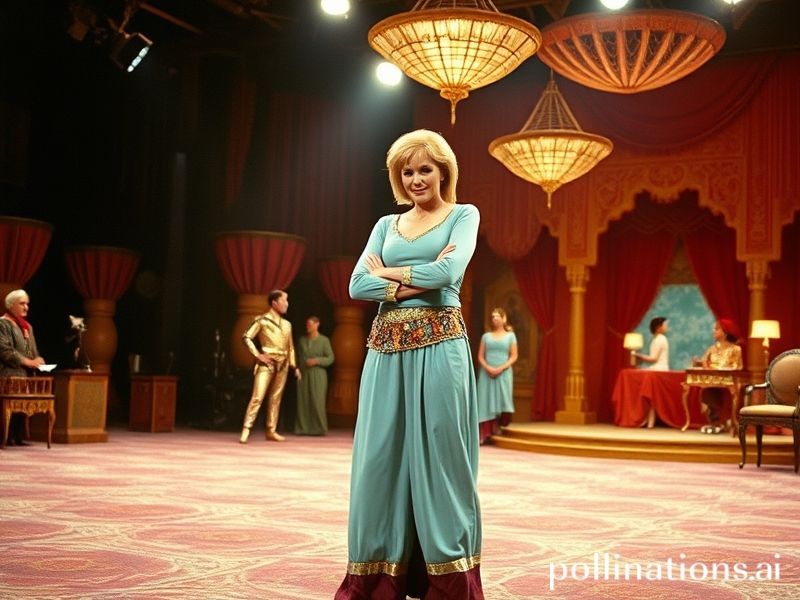Barbara Eden at 93: The Accidental Geopolitical Genie Still Granting Wishes Across the Globe
From the Souk to the Streaming Queue: Barbara Eden’s Accidental Diplomacy in a Post-Genie World
By Our Correspondent in the Cheap Seats
Somewhere between the collapse of the Ottoman Empire and the latest TikTok cease-fire, a perky brunette in harem pants blinked into existence and never quite blinked out. Barbara Eden—actress, accidental soft-power envoy, and living proof that mid-century America could weaponize camp—turns 93 this year, and the planet still hasn’t exorcised her.
In the bazaars of Marrakesh you can buy bootleg I Dream of Jeannie box sets shrink-wrapped beside knock-off Ray-Bans and “authentic” Aladdin lamps. The vendors don’t know her name, but they know the silhouette: bottle, ponytail, mischievous smile that launched a thousand sanctions debates. In 1965, when Eden first crossed her arms and nodded, she was merely selling Nielsen ratings. Six decades later she’s an unwitting artifact of globalization: the American dream distilled into 22 minutes, dubbed into 47 languages, and weaponized by every side of the culture war.
Consider the optics. The U.S. State Department once screened Jeannie episodes in Riyadh to show how “liberated” American women could be—while still living in a glass prison and calling a man “Master.” The irony was so dense you could pave a runway with it, which, coincidentally, is what the U.S. did nearby. Meanwhile, in East Berlin, teenagers risked Stasi interrogation to watch Eden blink NATO consumerism directly into their living rooms. One flash of invisible pink satin and suddenly Marx looked stodgy; the wall crumbled not on Reagan’s watch but on Barbara’s.
Fast-forward to 2024. Streaming algorithms have shoved Eden back into the zeitgeist like a pop-culture ouroboros. Netflix Turkey reports that Gen-Z viewers binge Jeannie as “vintage ASMR”—all those soothing chimes and submissive double entendres. In Seoul, feminist collectives host drinking games: take a shot every time Major Nelson exhibits toxic masculinity; wake up with a hangover and a renewed sense of purpose. Even Tehran’s underground art scene has reclaimed her: murals depict Eden swapping her pink harem pants for a green protest hijab, bottle labeled “Regime Change” tucked under her arm like a Molotov mocktail.
And yet, the woman herself remains cheerfully oblivious to her geopolitical side-hustle. Asked by an Australian morning show whether she felt “responsible for the Western gaze,” Eden simply laughed—an immaculate, tinkling sound that could probably broker a trade deal if looped long enough. She now spends her days answering fan mail in Beverly Hills, signing glossy 8x10s that later appear on eBay beside Syrian refugee art and Soviet gas masks. Capitalism, ever the magpie, has turned her autograph into a commemorative coin for the end of history.
The broader significance? Eden is a Rosetta Stone for the post-war Pax Americana: equal parts liberation fantasy and patriarchal instruction manual. She taught the world that power could be playful, so long as it was bottled, blonde, and ultimately beholden to a man in uniform. Every drone strike comes with its own sitcom laugh track; every peace summit owes its choreography to a wink and a folded-arm nod.
So raise a glass—preferably something curved, with a stopper—to the last living genie of the Cold War. She never asked to be a geopolitical metaphor, but then again, neither did the rest of us. In a world where nations rise and fall on the whims of algorithms and oligarchs, Barbara Eden endures: a shimmering reminder that soft power is just hard power with better hair and a laugh track.
May we all blink our way out of this mess half as gracefully.







